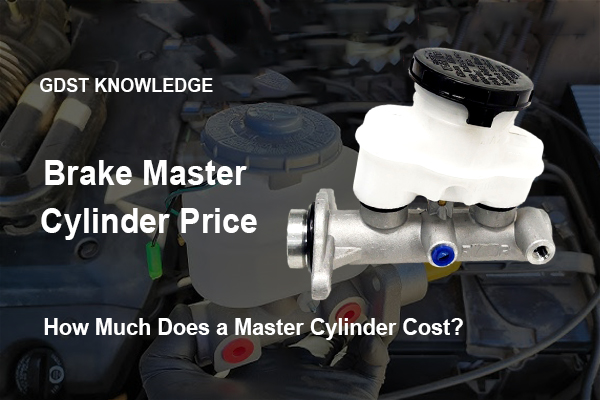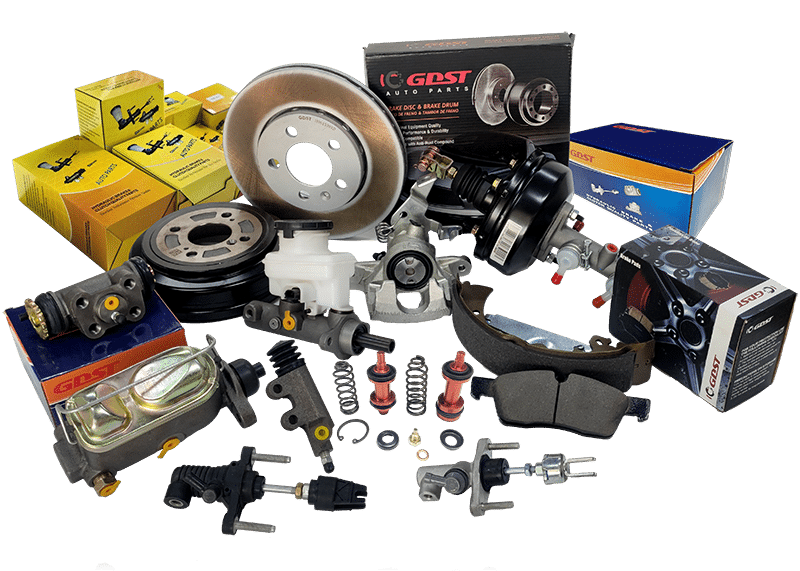Do you want to know how much it costs to replace a master cylinder for your vehicle? It’s really a headache to compare the prices and options. Here in this guide, we will clarify the cost of replacing a master cylinder, and help you make a decision.
Typically, it may cost you around $300-$800 to replace a brake master cylinder. The final price depends on your car model and the labor cost. You’d better ask the professional mechanic to give you an accurate quotation according to your car’s condition and the difficulty of replacement.
Let’s dive deeper into what affects these costs and how to identify when a replacement is needed.
What are the Symptoms of a Bad Master Cylinder?
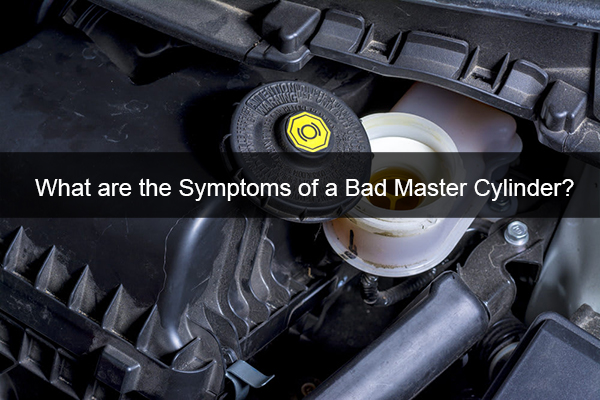
A faulty master cylinder in a vehicle can cause some noticeable symptoms that can affect the performance and safety of the braking system. Here are the signs you should pay attention to:
- Soft or Spongy Brake Pedal: One of the most common symptoms of a failing master cylinder is a brake pedal that feels soft, and spongy, or needs to be pressed down farther than normal to engage the brakes.
- Brake Pedal Sinks to the Floor: If the brake pedal slowly sinks to the floor while you hold it down at a stop, this can be a sign of an internal leak in the master cylinder.
- Braking Performance Degraded: If the master cylinder is compromised, the braking power will be decreased and it is difficult to stop the vehicle.
- Brake Pad Wear Unevenly: If the master cylinder can’t distribute pressure well to four brakes, you may find the brake pads worn unevenly.
- Leaking Brake Fluid: A visible sign of a bad master cylinder is leaking brake fluid, usually found under the vehicle near the wheels or directly under the master cylinder.
- Check Engine or Brake Warning Light: If the check engine or brake warning light on the dashboard illuminates, it may indicate a problem with the braking system. The master cylinder could be the cause.
- Strange Noises When Braking: Less common, strange noises when pushing the brake pedal may also indicate problems with the master cylinder or related components.
Can You Drive with a Bad Master Cylinder?
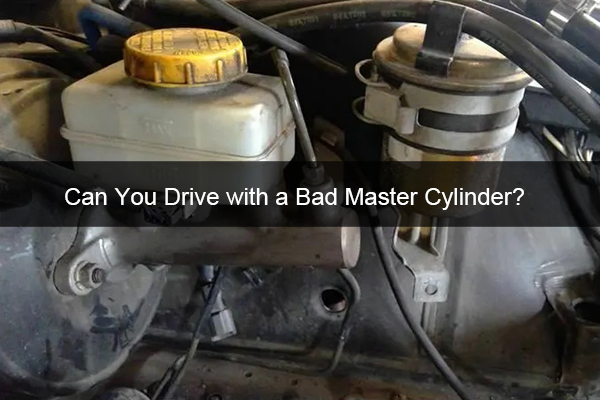
It is strongly not recommended to drive with a bad master cylinder.
The master cylinder is an important part of the braking system in your vehicle. It converts the force from the brake pedal into hydraulic pressure, which activates the brake calipers or drums to stop the vehicle. If the master cylinder fails, you will lose the braking power or have a complete brake failure under certain circumstances.
Here are some reasons why it is unsafe to drive with a bad master cylinder:
- Braking Efficiency Reduced: A defective master cylinder can greatly reduce the efficiency of your braking system, leading to longer stopping distances and probably causing accidents.
- Inconsistent Brake Feel: If the master cylinder is going bad, you may feel the brake differently. For example, the brake pedal is spongy or soft, and you can’t judge how much pressure is needed to stop the vehicle safely.
- Total Brake Failure: In the worst case, a bad master cylinder will cause total brake failure. This situation happens when the master cylinder can’t generate enough pressure to activate the brake, or it leaks brake fluid, and then the hydraulic pressure will be lost.
- Increased Accident Risk: Above problems, driving with a bad master cylinder will increase the risk of an accident, not only for you but also for other people on the road.
- Legal and Insurance Implications: Driving a vehicle known to have a critical safety issue, such as a faulty braking system, may bring you legal and insurance implications, especially if an accident is caused by it.
What Affects the Cost of a Master Cylinder Replacement?
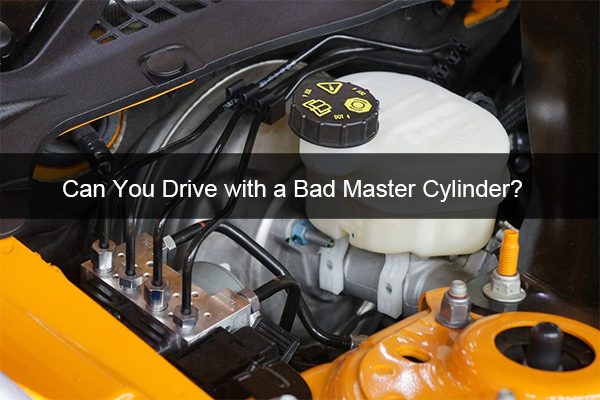
The cost of replacing a master cylinder varies greatly based on several factors. Knowing these factors will help you know how much you need to spend and make a wise decision when you fix it. Here are the main elements which affect the cost of replacing a master cylinder:
- Vehicle Make and Model: The vehicle type is the most important factor that affects the cost. Luxury and performance vehicles always use more expensive parts than the regular or old models. Besides, some vehicles have the master cylinder which is hard to get or replace, increasing labor costs.
- Part Quality: There are various qualities of the master cylinder in the market. OEM parts are more expensive, but they can be sure to match the specs of the replaced parts. Aftermarket parts are cheaper, but the quality varies.
- Labor Rates: The labor costs vary a lot, according to the mechanic or dealership and their location. Usually, specialty repair shops and dealerships charge more per hour than independent mechanics. Also, the labor costs vary greatly by region. The urban areas usually charge more than rural areas.
- Additional Repairs: Sometimes, the bad master cylinder is caused by or a symptom of other problems in the brake system, such as the brake lines leaking or the brake calipers having issues. If additional repairs are needed, the cost will be more expensive.
- Fluid Replacement and System Bleeding: After you replace a new master cylinder, you have to bleed the brake system to remove the air pocket in the brake line. It’s necessary to make sure the brake works properly. And it needs additional labor and maybe new brake fluid. So it may increase the cost.
- Geographical Location: As mentioned, labor rate can be very different according to the geographical location. Urban areas with higher living costs usually have higher mechanic labor rates than rural areas.
How to Choose the Right Master Cylinder for Your Vehicle?
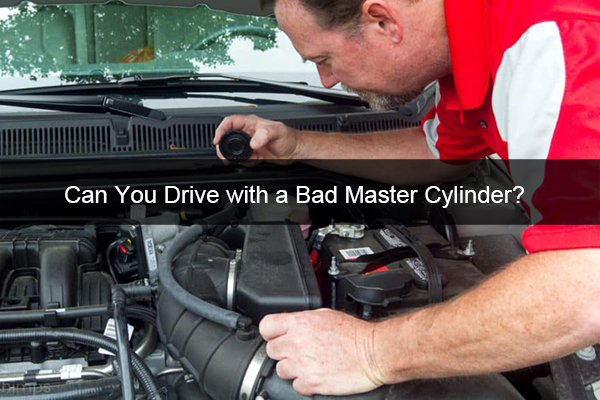
Selecting the right master cylinder is critical to guaranteeing the best brake performance and safety for your vehicle. The master cylinder is a critical part of the brake system, which transfers the force from your brake pedal to hydraulic pressure to activate the brakes. Here is a guide for you to choose the proper master cylinder:
- Refer to Your Vehicle’s Manual
Your vehicle’s owner’s manual or repair manual will have the specifications for the correct master cylinder. This is the best starting point. - Check the OEM Specifications
Please check the OEM part number and specification. Using OEM parts can ensure compatibility and reliability because they are designed for your vehicle model. - Decide the Brake Type
Confirm whether your vehicle is equipped with disc brakes, drum brakes, or both (disc front, drum rear). Some master cylinders are designed only for disc brakes or drum brakes, while others are universal. Different brake types will lead to different internal structures and pressure output of the master cylinder. - Bore Size
The bore size of the master cylinder will influence the hydraulic pressure and brake pedal feel. A larger bore provides more force, but the pedal effort is higher. On the contrary, a smaller bore requires less pedal effort, but the force to the brake is reduced. It is important to choose the bore size according to the vehicle’s requirement for best performance. - Material
Master cylinders are usually made of aluminum or cast iron. Aluminum is lighter and more anti-corrosive, while cast iron is more durable but heavier. Choose the material according to your vehicle’s performance and environment. - Brand Reputation
Search brands to find one with a good reputation for quality and reliability in brake system components. Read reviews and ask mechanics or automotive forums for recommendations. - Warranty and Support
Look for products that come with a warranty and good customer support. A warranty can provide peace of mind and protection against defects. - Consider the Whole Brake System
Don’t forget to check the compatibility with your brake system, like brake lines, brake booster, calipers, or wheel cylinders. Sometimes, if you upgrade one component, you have to adjust or replace others to get a balanced performance. - Professional Advice
When you have any questions, please consult with a professional mechanic or brake specialist. They can give you some useful suggestions according to their experience and knowledge about your vehicle. - Regulatory Compliance
Please make sure the master cylinder can meet the safety and regulatory standards in your region. It’s especially important when you choose the aftermarket options.

